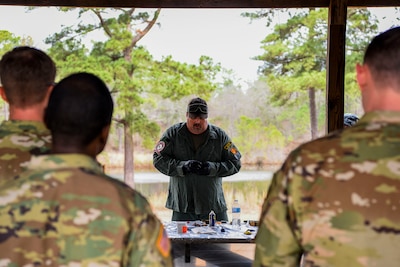By Army Capt. Tammy Muckenfuss 108th Public Affairs
Detachment
WEST COLUMBIA, S.C., Feb. 28, 2018 — Soldiers from the South
Carolina Army National Guard’s 43rd Civil Support Team joined with area first
responders here Feb. 20-22 for a “micro lab” training course designed to teach
them how to handle lab investigations and entries safely and effectively.
Network Environmental Services Inc., a company out of
Folsom, California, trains military and civilian first responders across the
country on safe measures and procedures in dealing with chemical and physical
hazards presented by the illicit synthetic drug trade, using a combination of
classroom and hands-on training to familiarize them with technical chemical
terms and to see firsthand the processes drug dealers use to create the
products they sell on the street.
The company’s instructors are police officer, former Drug
Enforcement Agency employees and chemical experts.
Fentanyl Exposure
Michael Cashman, an instructor and retired DEA employee,
“said fentanyl exposure is one problem first responders face.
In the last several years, law enforcement agencies have
seen a dramatic increase in the availability of dangerous synthetic opioids, a large
majority of which are derivatives of fentanyl, a synthetic analgesic 80 times
more potent than morphine. The presence of synthetic opioids in the illicit
U.S. drug market and the potency of these drugs has led to a significant
increase in overdose incidents and overdose-related deaths throughout the
nation.
“Fentanyl is not just a police problem, or a [civil support
team] problem. It’s everyone’s problem,” Cashman said. “We are seeing more and
more fatalities from fentanyl exposure. The goal of this training is safety. We
want to make sure that when these guys enter a situation and see evidence of
fentanyl, they know what to do.”
The class reinforces what to look for to recognize and
reduce the dangers of fentanyl exposure for first responders. Since fentanyl
can be ingested orally, inhaled through the nose or mouth, or absorbed through
the skin or eyes, any substance suspected to contain fentanyl must be treated
with extreme caution as exposure to even a small amount can lead to significant
health-related complications, respiratory depression, or death.
New Threat Environment
Army Lt. Col. James Bowling, the 43rd CST commander,
coordinated the training with local first responders and civilian partners to
increase his team’s readiness to respond in multiagency civilian incidents.
“The threat environment has changed,” he said. “What we are
seeing is that homemade explosives, weapons of mass destruction, hazardous
materials, and even clandestine lab processes often look very much the same and
have a lot of the same ingredients and precursors. What this training does is
increase our situational awareness. When the CST and our civilian partners
respond to a call, we have to know what to look for to ensure everyone’s
safety.”
“Providing this level of specialized training for our Civil
Support Team and civilian law enforcement partners is critical during an
incident response,” said Army Maj. Gen. Robert E. Livingston, South Carolina’s
adjutant general. “These soldiers are on the front lines every day safeguarding
our communities. Therefore, their safety is a top priority.”

No comments:
Post a Comment